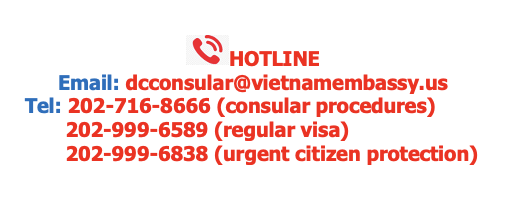A step backwards for US - Viet Nam relations
07/20/2004 -- 17:45(GMT+7)
Ha Noi, July 20 (VNA) - Some US parliamentarians and politicians have, for years now, hindered the normalisation of bilateral relations between the US and Viet Nam by cooperating with anti-Viet Nam elements among the overseas Vietnamese community in the US in mobilising and arranging with the US Congress and Government to pass legislations and moves against Viet Nam.
A legislation they have pursued with determination is the so-called "Viet Nam Human Rights Act" - a completely fabricated document filled with plots to brutally intervene in the internal affairs of sovereign Viet Nam.
The US House of Representatives on July 19 endorsed the so-called "Viet Nam Human Rights Act of 2004" coded HR 1587. Sponsored by Rep. Christopher Smith, HR 1587 distorted the democracy and human rights situation in Viet Nam and falsely accused the Vietnamese Government of failing to respect religious freedom. Based on these complete fabrications, the proposed legislation asked the US Authorities to stop providing non-humanitarian aid to Viet Nam, while asking for increased funding for illegal organizations and individuals as well as propaganda agencies to launch anti-Viet Nam activities.
In the debate over HR 1587, members of the Parliamentary Group for the US - Viet Nam Relations strongly rejected the proposed legislation and called on other congressmen to vote against it, leading to 23 Republicans and 22 Democrats voting against the proposed legislation.
The Viet Nam Human Rights Act of 2004 is nothing new. On September 6, 2001, when approving the US - Viet Nam Bilateral Trade Agreement signed by the US and Vietnamese Governments on July 13, 2000, the US House of Representatives passed the Viet Nam Human Rights Act. Many pointed out that the reason behind the US authorities' intentional delay in passing the BTA was to give more time for preparing the legislation.
Some US activists publicly advocated that the US would lose an opportunity to politically pressurise Viet Nam if human rights was not attached to the bilateral trade agreement.
Rep. Christopher Smith arrogantly said that the US House of Representative endorsement of HR1587 showed that the US was still interested in "human rights record" in Viet Nam.
Notably, the Viet Nam Human Rights Act was not approved by the US Senate three years ago. So, it is now still a proposed legislation. This year, it must also be submitted to the US Senate after its endorsement by the House. Even if the Senate approves, it will still have to receive presidential approval.
Last year, those who opposed Viet Nam in the House used new tactics to get other Representatives to support their action. Fully aware that they could not get the so-called Viet Nam Human Rights Act passed should they continue swimming against the mainstream of American public wishing to widen and deepen the mutually-beneficial multi-faceted ties between the US and Viet Nam, therefore in July 2003 the hostile forces proposed some articles of the Human Rights Act be added to the Foreign Relations Authorisation Act coded H.R. 1950 as supplements. This made it easy for the House to pass H.R 1950 on July 15, 2003.
Under the measure, US non-humanitarian aid to Viet Nam is closely linked with "improved human rights record aimed at promoting democracy and freedom in Viet Nam". The US Department of State is also requested to make its annual report on the so-called list of "detainees and dissidents" in Viet Nam. The bill approved 10.2 million USD for non-governmental organisations that "promote democracy in Viet Nam and for work toward overcoming the Vietnamese jamming of Radio Free Asia (RFA)" which is now stationed close to Viet Nam in a bid to distort the real situation in the country.
On November 19, 2003, the House also passed Resolution H.R 427 on the so-called religious freedom in Viet Nam, extolling the leadership of outlawed United Buddhists Church and expressing "determination" to ask Congress to approve the Viet Nam Human Rights Bill and the President to sign it into law, as well as to urge Congress and the US administration to implement the recomendations presented by the US Commission for International Religious Freedom (adding Viet Nam to the list of countries of "special concern").
The passage of the Viet Nam Human Rights Act of 2004 (H.R 1587) by the US House of Representatives is nothing but a step toward implementing the "determination" of those opposing the improved US-Viet Nam relations. This is a move detrimental to bilateral relations and contrary to the common aspiration of all American people.
Viet Nam has repeatedly reiterated that Rep. Christopher Smith and his supporters can not use the authority of the Vietnamese government and people. Their dark attempts and heinous actions will certainly be foiled although they are disguised in whatever forms against a nation that loves peace, independence and freedom and is willing to broaden friendly relations with all other nations on an equal footing.



